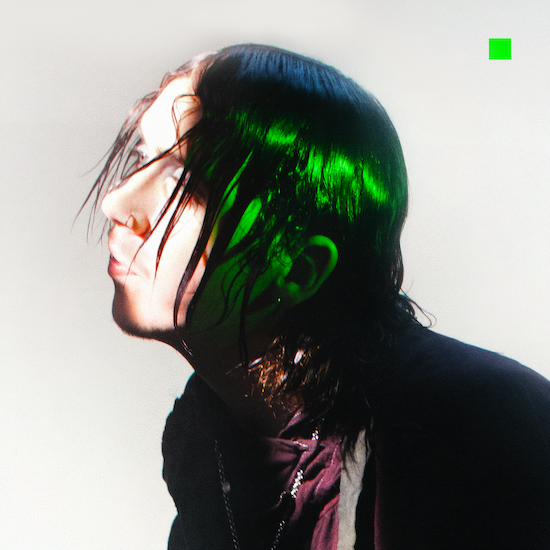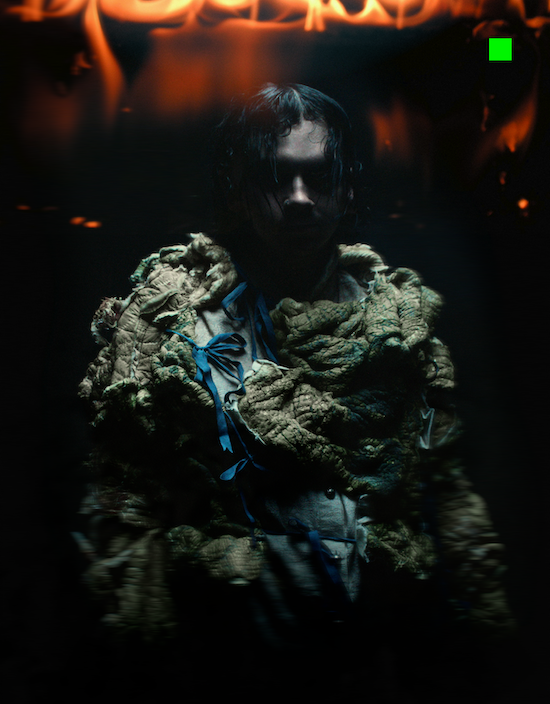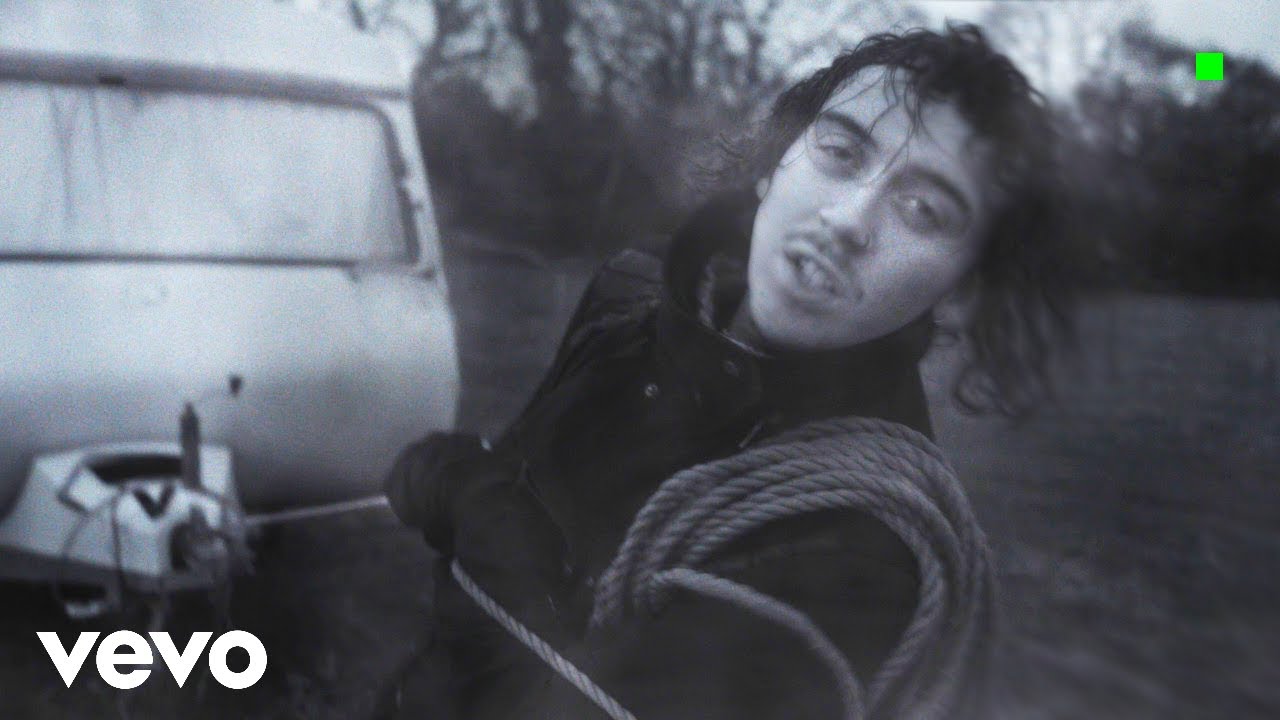Photos by Furmaan Ahmed
According to Kai Whiston, traveller communities believe in aliens. "Every fucking traveller you speak to has an alien experience," he tells me over video call, speaking into a large microphone as if he’s hosting a podcast. "So I’ve pushed that sonically and visually. The aliens do exist and they are operating in Stonehenge. The travellers were right."
Whiston’s third album, Quiet As Kept, F.O.G., landed last Friday. Drawing inspiration from aliens, 90s rave motifs – both sonically and in iconography of caravans and peace convoys, growing up among new age travellers (including his raver artist mum, Helene, who features heavily on the record), and several different fantasy lands, the music, in keeping with Whiston’s work to date, takes ideas and pushes them, exaggerates them, builds them to bursting. "It’s very maximal," he says. "Both artistically and aesthetically."
Quiet As Kept has been in the works for three years, almost to the day, since the release of his last album No World Eternal, three years he describes as "disgusting, hermitting, mood boards, artwork, videos, everything." But in all its fantastical, maximalist experimental pop, this record has allowed Whiston to explore parts of himself and his background that, for most of his life, he kept hidden and felt shameful of. It’s an album with great meaning, a meaning that only really began to show itself as the project came to life.
A graphic novel, titled Div Era, will also form part of the Quiet As Kept project, which Whiston is working on with his mum. "It’s been great seeing her express herself artistically with this project," he says with a grin. "It’s given her motivation." After growing up in a house full of artworks and doodles and a shared fascination with Jamie Hewlett, Deadline magazine and Gorillaz, Div Era is a chance for the pair to create something together inspired by this common interest.
"I’ve always been very self-focused and interested in this need to build my career," Whiston explains. But Quiet As Kept has been as much about building his understanding of self and his relationship with his mum as anything else. "In a way this project was the easiest because I knew the community and the things I wanted to say so well," he reflects. "It was all already in there, I just needed to be honest with myself about it."

A page from Div Era
When you’re working on something for a long time in a very private and personal way, and then suddenly it’s out there in the world, that must be a strange feeling.
Kai Whiston: There’s a big feeling of relief and some excitement. But I also have a sad moment too, because it’s not mine anymore. I just give it to everyone else. I have this secret thing that I really enjoy, that I totally obsess over, and then suddenly, that’s that. It’s almost as if when I release a new project it gets archived immediately, I never really listen to it again unless I have to. So it’s on to the next thing.
As with anything creative, you could keep working on it, fine tuning, editing, adding flourishes, forever. How do you find that process of calling time on a project?
KW: I had many moments with this record where I thought it was done, but then I kept breaking this weird boundary I’d set for myself. Two years ago, when much of the tracklisting was done, it was almost a similar album to what it is now. These days I need to insert a two or three year boundary in order to allow my life to change. To allow myself to grow – outside of fiddling around with music – my perspectives, my general outlook and the things I like. These things shift in a years-long period. Over time what comes out is a more eclectic project.
So when did you start working on this record?
KW: It’s a horrible habit of mine, but pretty much immediately as my last album [No World As Good As Mine] was being rolled out. I’m so close to the finishing line and it’s like this devil procrastinator in my head going, "Oh, here’s a new idea. Maybe you should start making music for no apparent reason!" This time around I’ve had to force myself not to do the same thing, so I can focus on the promotion aspect.
The initial ideas didn’t have anything to do with 90s rave music, or my mum or my upbringing. Instead it was focused on being weightless and ambient sonically. It felt like the flipside to what I’d just done. I find myself making instinctive contrarian pivots. When I know that people like my music for a particular reason, I want to try and build my skill set in other areas. So I wanted to make intricate, beautiful music, inspired by the PAN compilation Mono No Aware. I wanted to meander in the idea of quietness, looking inwards, working on a more mature sound – whatever that means.
At one point, and I don’t know why I did this because I had never really used drum samples before, but I added this classic 90s drum loop to a track and it was like everything came in all at once. I remember the feeling really vividly; this drum break was my mum, my childhood, The Prodigy and Massive Attack.

So the foundations of the album transformed because of that sample?
It really felt like a big movie moment. I wanted to do my own version of dance music, inspired by my household growing up and traveller communities. I was turning 21 at that point, and starting to develop the emotional connection I had with my parents and my upbringing. My relationship with my mum had been this complicated thing where I had a lot of animosity because of our situation financially. Not in a blame way, but because, especially in creative industries, you see so many privileged kids. Back then I wished we could swap places. Now I feel very grateful for it, and this drum break made me want to focus on the relationship with my mum again.
As you found this inspiration in your mum, her community, her raving and your upbringing, did you have conversations with her to add colour and context to your memories?
KW: Completely. You can hear some of those conversations sampled in the album. At first she was surprised, she didn’t think I cared about the history. But the truth is, when I was a kid in a small town with an arty raver girl for a mum, I stuck out like a sore thumb and I just wanted to fit in and be normal. I think I suppressed that in myself for a long time. I went to uni to study business, sort of in reaction to my mum being this hippy artist. I wanted to be sensible, whatever that definition of sensible is.
The dynamic I have with my mum is sometimes blurred between parent and child. She’s been young her whole life, it’s an amazing thing. I told her about this project, and wanting to study new age travellers, and in doing so I embraced these parts of myself I had been suppressing. When you’re a kid you don’t care and you just want to be left alone, but now, hearing her talk about the Battle Of The Beanfield or Castlemorton, those things are remarkable. And the political overtones were very ahead of their time.
Those conversations with her were really valuable, hearing about the crazy life she’s had, her experience of having a child and then losing the father of that child, it was a relearning experience for me. I used to roll my eyes at her stories and now I find immense value in them. And in my approach to the music too. You never appreciate your parents’ music taste until you grow up. I knew Massive Attack were good but I didn’t realise how good, or understand the history and the lineage.
Besides Massive Attack, what are your earliest, formative memories of music?
KW: A lot of it is that my mum has always blasted music in the house to the point of inconvenience. It’s funny to me when people describe me as eclectic when my mum is far more so in terms of her taste. It feels like she was part of every counterculture in the 80s and 90s. Part goth, raver, punk, you name it. That’s helped develop my approach to genre. She’d play The Prodigy, The Future Sound Of London, Kate Bush, Siouxsie And The Banshees, Disturbed and that extremely eyeliner goth band HIM. I also have a distinct memory of her sitting me on her lap to play me some Led Zeppelin for the first time, wanting it to impact me as it had her. It worked, because I grew my hair long and started playing guitar. That set me on the collision course.
Our house also looked like a 16-year-old’s bedroom – there were posters everywhere. Rockstars, DJs, I think that’s what led me into having an interest in music, it was to do with the iconography.
I got into music production more through digital art. I got a computer through a government scheme for low income households or something and once we got broadband I became obsessed with YouTube. From there, I got a free version of photoshop and was doing that and then I got into video editing through a game, do you remember a game called Club Penguin?
Let me Google it, important research.
KW: It was silly, but I started making music videos on Club Penguin. Around that time I got into EDM like Skrillex and Deadmau5 and then when I was 14 or 15 I started to learn about weirder things like Aphex Twin and MF DOOM, learning what sampling is, going deeper into electronic stuff and finding Death Grips and Daft Punk. Then the rabbit hole took me to Clams Casino and Evian Christ. That was when I really started making music and something just clicked.
My friend Josh [AKA Ship Sket] and I were always making songs together. There we were in Shaftesbury, Dorset, and it felt like this thing was ours, like we were the only people in the whole school that cared about this music.
There’s a group of you that have come out of Dorset making interesting electronic music, why do you think that is?
KW: If you’re a weird internet nerd I think you sort of gravitate to each other. That’s how I found out about Iglooghost. There is a lineage of artists from that town – Dark Sky, memotone, Iglooghost and now me. I need to find out if there’s anyone making electronic music in Shaftesbury now that we’re overlooking, I feel like the lineage needs to continue.
It would be nice to keep it going.
KW: We’re on the hunt, but as we don’t live there anymore it’s harder.
In the way that you have explored your upbringing in making this record and thinking about this record, what do you think you’ve learned about yourself?
KW: I used to think that my internet-based upbringing was the only reason I got into music and how I broke out of the wrath of council estate England. I thought I was so unlike my mum, but now I know that’s not the case. She shaped me in so many ways, directly or indirectly, as did the environment I grew up in, surrounded by travellers.
Her free spirit brought me to the person I am now. I always knew I was different from other kids and I think my upbringing says a lot about me today – my drives and motivations, my contrarianism, wanting to be recognized. Even being a traveller, one of the definitions of Quiet As Kept is how I suppressed my background for so long. I felt the discrimination and taboo around it was too much and I wouldn’t be able to put up with it.
Now with this album, I’m saturating everything I can with this part of me. It’s been a big exercise in looking inward, into my own stories and then blending escapism with realism or the fantasy with the everyday. It’s a bit of a chicken and egg situation. Has the project led me to be more mature? Or was it just that period of my life when you enter your 20s and become an actual person? I’ve always had these instincts to do things and now I’m asking: Why? How? I’m challenging myself to be more inquisitive of my own ways of doing things.
Kai Whiston’s new album Quiet As Kept, F.O.G. is out now via Lux Recordings



